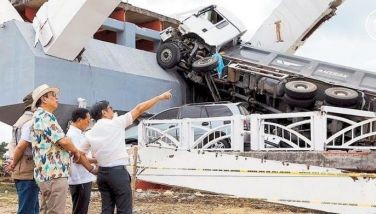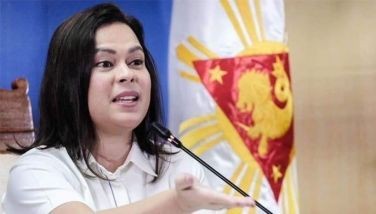DAP lacks transparency, Miriam says
MANILA, Philippines - Sen. Miriam Defensor-Santiago believes the Disbursement Acceleration Program (DAP) lacked transparency from the start.
As early as the impeachment trial of ousted chief justice Renato Corona in 2012, it has not been transparent, she added.
Nobody knew about the DAP until Budget Secretary Florencio Abad explained the P50-million additional funds distributed to each senator-judge after the conviction of Corona, Santiago said.
The DAP came out after Sen. Jinggoy Estrada revealed a supposed bribe to senator-judges in a privilege speech last year.
“That was introduced into our vocabulary only after the impeachment trial. That is the downside to extreme secrecy... lack of transparency.
“In my case, I never knew. I had no clue. I was completely clueless about the DAP while we were struggling with legal technicalities during the impeachment trial.†Santiago said she was not aware that the executive department released extra funds later known as DAP at the height of Corona’s impeachment trial. She said the test for bribery was not when it was given, but whether the amount influenced a senator-judge to change his decision.
“For example, if you give a senator a basket of mangoes, that’s not bribery, that’s not going to change his mind. But if you give him P50 million, that would change his mind,†she said.
“Now they are arguing whether this was given before, during or after the impeachment? That is not the test for whether there has been bribery. The test for bribery is this: Whether that amount is sufficient to change his mind. That is the test for bribery. So you have to ask yourself, was the amount sufficient to change his mind?
“We are all of course, required, sitting as trial judges, to keep an open mind and keep a cold neutrality of an impartial judge,†she said.
“But if that amount was sufficient to remove that cold impartiality then that is a bribe, whether it was given before, during or after, it doesn’t matter.â€
‘Gov’t arguments alibis’
A petitioner labeled as “alibis†the government’s arguments in defending the DAP’s legality before the Supreme Court (SC).
Making the arguments during the third and final oral argument last Tuesday were Solicitor General Francis Jardeleza and retired SC Justice Vicente Mendoza.
In a statement, former Manila councilor Greco Belgica said: “Not even the brilliant Justice Mendoza was able to disprove the illegality of DAP. The government’s defense was an alibi.â€
Mendoza argued that the petitioners have no legal standing to question the DAP.
The principle of separation of powers would be violated if the SC rules on the issue because “no actual case of controversy†exists, he added.
Petitioners should have first question the DAP before the Commission on Audit or the trial courts, Mendoza said.
However, Belgica said he and other petitioners came to the right place to question the DAP’s constitutionality.
“It is our right as taxpayers to question this abusive system of government spending,†he said. “We are the most aggrieved party in this case and only the Supreme Court can answer such constitutional question.â€
Mendoza insisted that petitioners availed of the wrong remedy in filing the petition when they cannot be considered aggrieved parties under Rule 65 of the Rules of Court.
Petitioners also failed to exhaust all other legal remedies before bringing the matter to the SC, he added.
Responding, Belgica said an actual case exists for the SC to rule on.
“As citizens, it is our right not just to tell government officials to stop stealing and diverting our money, but fire these crooks and make them pay and tell them to give back what was stolen or illegally used,†he said.
In the second oral argument last Jan. 28, the Office of the Solicitor General said the SC need not rule on the merit of DAP as the program has ceased to exist.
Belgica said the defense was an admission of the DAP’s illegality and an attempt to evade the real constitutional issues raised in the petitions. “The government’s attempt to make our DAP petitions moot, in effect, is an attempt to make illegal acts impossible to punish,†he said.
Filing the eight other petitions last year were former lawmaker Augusto Syjuco, lawyers Jose Malvar Villegas Jr. and Manuelito Luna; Philippine Constitution Association (Philconsa), Integrated Bar of the Philippines (IBP), Bayan Muna, Kabataan and Gabriela, Confederation for Unity, Recognition and Advancement of Government Employees (Courage), and the Volunteers Against Crime and Corruption. – With Edu Punay, Paolo Romero
- Latest
- Trending




























